How did Li Bai and Dufu write so many poems?
Author:Henan Satellite TV Time:2022.09.28
"Li Dushi has a lot of mouth, so far not fresh."
The "complaint" of the "complaint" of the Qing Dynasty literati Zhao Yi in "On Poetry" illustrates how popular Shi Xianshi is in history from one aspect.
So the question comes: in ancient times, there were no media and no networks. Sometimes it was difficult to pass a book book. How did these poems spread and passed on to future generations?

Li Bai, Du Fu, Gao Shi Yongyou Liangyuan/Documentary "Eternal Romance People"
Select the "platform" to help poetry increase fans
How did Tang Shi spread? Not to mention that the ancients really had a set of ways.
Tang poetry was one of the ways to express emotions at that time. Just like we are now sending friends in a circle of friends, "Title Poetry" is a way of spreading poetry spread by literati in the Tang Dynasty. It is also a strange platform for poetry to capture thousands of fans.
It is said that as long as you have a question, as long as you have a place of prosperity, every type of building or a trunk of mountains and stone bridges can write graphic text, you can write painting. The literati of the Tang Dynasty especially liked this method. According to statistics, there were more than 300 authors of the Tang Dynasty poems, and the works left were nearly a thousand.
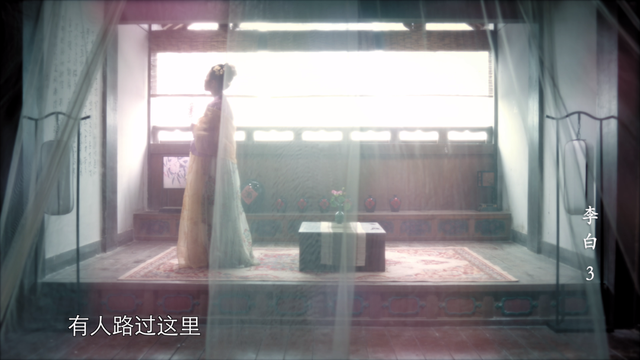
Miss Zong Qianjin Buy Wall/Documentary "Eternal Romance People"
The poet Han Shan is the number one fan of the poem. According to the exam, Han Shan, who was born in the official and officials, has been forced to become a monk. Perhaps because of this, Han Shan wrote many poems on Lin Ye Kuan, and wrote a lot of poems. As the so -called: "One live in the Han Mountain is a break, and there is no thoughts. I have no thoughts. I am idle at the stone wall, and Ren Yun is not the same as the boat."
How many poems did Han Shan write? According to "Taiping Guang Ji": "Those who have good things are recorded, and more than 300 songs ... can incentive vulgarity." It is estimated that Han Shan himself did not expect that these moods left on the stone wall resisted the erosion of the years. It has also resonated with countless thoughts in the circulation.
In addition to being able to harvest fans, the poems of the inscriptions can also pass love. Legend has it that Cui Hu was scattered on the list. He encountered a beautiful woman in the south of the capital. Afterwards, he re -swimming, his feelings moved, and the poem of the door was the eternal sentence "I don't know where the human face goes, and the peach blossoms still laugh in the spring breeze."
In addition, Lu You Tang Wan, who is familiar with everyone, is also a matter of inscription outside Shen Yuan, and thinking with each other. The silent wall boards have become the online community of poets and poetry "rising".
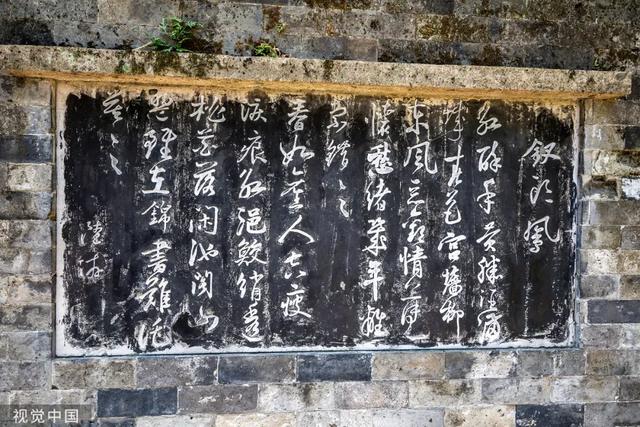
The poem "钗 头" in Shaoxing Shenyuan
"Zoule" waves, please come out of the high cabinet in poetry and dance
In the Tang Dynasty literati Xue Yuxian's "Ji Yi Ji" recorded such a story. During the period of Tang Xuanzong, the poet Wang Zhizheng, Wang Changling, and Gao Shi were studying in Luoyang. The three people had good relationships, and poetry also received each other. One day, the three went to the restaurant to drink. When I saw a few women in Liyuan came to the building, the sound of silk bamboo sounded, so I decided to come to a special game -to see who's poems were mostly compiled in the lyrics!
After a while, the gentle singing rolled around, it was Wang Changling's poem. Wang Changling took a little bit of thought and scratched one with his fingers on the wall as counting. One song, but did not see Wang Zhizheng's poems, Wang Zhizheng was a little anxious, and when he gritted his teeth, he pointed to the most beautiful and best friends of the song girl to bet. Essence
Fortunately, the girl spoke, and the sound of music flowed across the white clouds, a lonely city. Why bamboo flute complain willow, spring is not degree Pass. At this time, the Wang Zhizheng was overjoyed. The three of them laughed and shocked the musician and the singer. Only then did everyone know that the original "Word Author" was at the scene. This is the origin of the idiom "Flag Pavilion Painting Wall".
It is quite legendary, but its scenery is not fictional. The Song Dynasty Wang Zhuo once said: "Li Tangling took the famous poems at that time into the song. Gai Gong also." Indeed, for a long time, music has always played a poem tour guide, leading the new words out of the paper and out of the high cabinet. Flowing to the streets and lanes, it is passed on to the mouth.
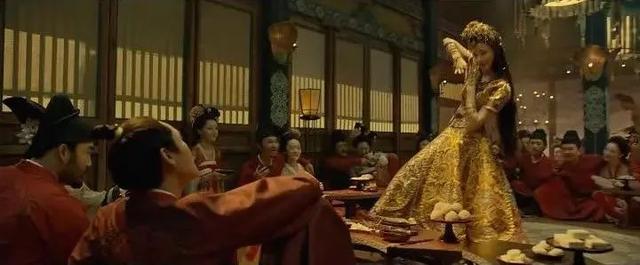
The scene of drinking and dancing in the Tang Dynasty in the film and television drama. Source/movie "Demon Cat Biography" screenshot
As early as the Han Dynasty, the court set up the "Lefu" that specialized in controlling music. One of the functions was to send people to visit various places to "pick poetry to make music." When Cao Mengde, he "must be taller, and the orchestra is made in movement."
This situation is even more common, and the singing has even become a way of "playing" a favorite work. For example, the national literati Liu Yong, where does the super high "popularity" come from? Isn't it that there is a well where there is a well, or you can sing Liu Yong's words?
Some people say that there is a poetic in the bones of the Chinese, and when they live, they make their lives a poem.
You think this is a metaphor of poetry. In fact, this is not the real scene in the cultural life of the ancients. Emotional expression is poetry, music and life are all poetry. For thousands of years, poetry has been integrated into the Chinese genes and has become part of a cultural life.
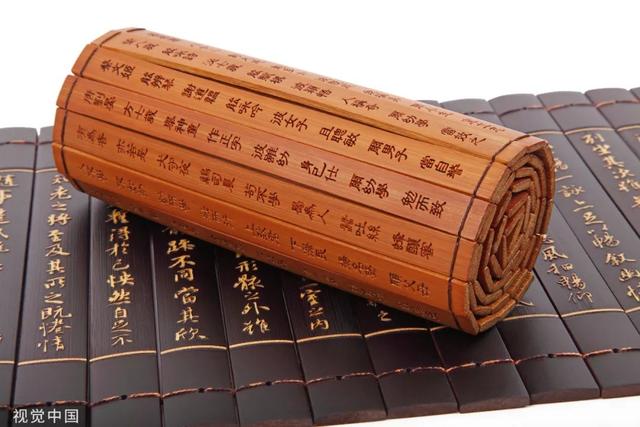
Collect and compile, let poetry cross time
"Poetry" is also a way to circulate ancient poetry. Ban Gu records: "The month of Meng Chun, the group will be scattered, and the pedestrian Zhenmu Duo is in the road to pick the poems. However, many documents and studies believe that this primitive poetry collection and finishing behavior is an important way to spread and spread early poetry. The Book of Songs is likely to benefit from this. Among them, the "national style" and "Xiaoya" are likely to be the crystallization of the Zhou Dynasty through the assistance of the vassal countries to assist in the general "picking poetry".
"The Book of Songs" collected 305 poems, commonly known as "three hundred poems". Thousands of years later, the young official Sun Yan and his wife Xu Lanying in the Qianlong period resolved the ancestors, selected 300 masterpieces from Tang poetry, discussed and compiled, and compiled them. A book "Three Hundred Tang Poems". Since then, the children's poetry has a real "textbook", and Tang poetry has gained a new vitality of life spanning for thousands of years. When it comes to Tang Shi, I have to mention the story of Hu Zhenheng's "Tang Yin Signing". Everyone knows that Li Bai has been famous in his life, and he does not know that Li Bai's poems are almost lost. It is said that Li Bai had handed over his life manuscript to his uncle Li Yangbing before his lifetime, and told Li Yangbing to compile a child for himself in order to spread the future generations. Li Yangbing did not live up to his expectations, and sorted out "Cottage" with his heart, with a total of 10 volumes. Unfortunately, "Cottage Collection" was lost in the future.
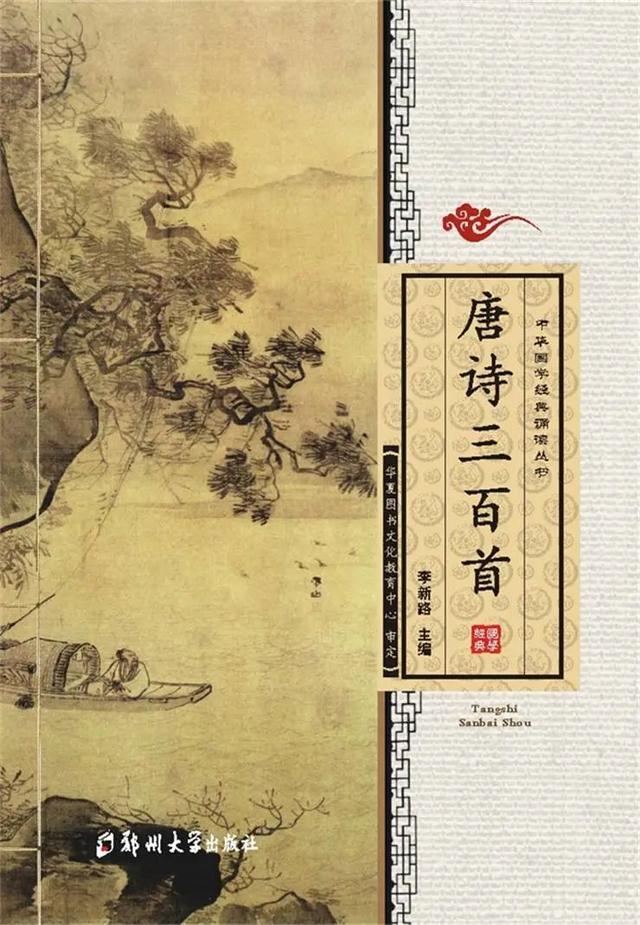
During the Ming Dynasty, Hu Zhenheng, a well -known collector and writer in Zhejiang, gave up his good careers to return to his hometown to collect Tang poetry. He used the 1033 volume of "Tang Yin Signing" compiled for a full ten years. It was the largest private book in ancient China and the blueprint for the compilation of the "Tang Poems" in the Qing Dynasty. Since then, Hu Zhenheng has used seven years to compile and publish "Li Shitong", which is more completely included in the works that Li Bai stayed at the time.
"Tang Yin Signing" a book "Tang Yin Gui Sign". Source/National Library
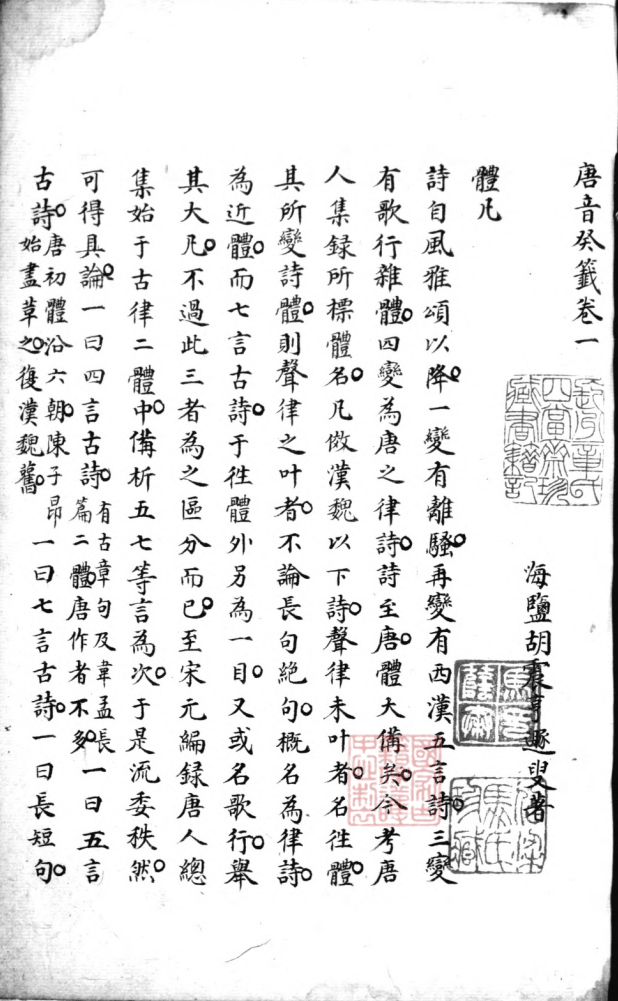
Zhang Ruoxu, who "is lonely in the Tang Dynasty", has only two poems spreading later generations, and only six poems of Wang Zhizheng who "Yiyi Yishan" stayed. For more than a thousand years, I don't know how many Tang poems have lost. Fortunately, because Hu Zhenheng took a lifetime energy, Li Bai's works were passed on to future generations.
(Source: National Human History Author: Nian Si)
- END -
"Heachi": The family feelings and bloody life of the children of the troubled times

Small incisions, large perspectives, characters are attractive, and the story is d...
[Memory] Looking at the Inner River Economic Development in the 1950s from the Chengdu -Chongqing Railway

Open from Chengdu -Chongqing RailwaySee the economic development of Neijiang in th...